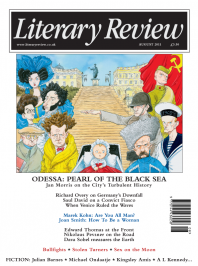Jonathan Keates
High Tide to Low Ebb
City of Fortune: How Venice Won and Lost a Naval Empire
By Roger Crowley
Faber & Faber 405pp £20
In the maritime museum in Venice are the few remaining fragments of the Bucintoro, that magnificent galley in which every year on Ascension Day the reigning Doge was rowed out into the lagoon to perform a symbolic wedding with the sea. Anthems were sung, trumpets blared, drums were rattled, fiddlers fiddled, the collective retina was assaulted by the shimmer of silks and brocades (and that was just the senators), the Doge threw a ring into the sea (which once or twice cast it back inside a fish’s belly), and La Serenissima reassured itself of an uncontested dominion over the watery element.
The justification for this mystic union, as Roger Crowley’s City of Fortune demonstrates, was pure geopolitical necessity. In its earliest years, as a huddle of villages on mudbanks in an Adriatic lagoon, Venice needed the sea for subsistence and protection. Maritime trade became the growing city’s raison d’être

Sign Up to our newsletter
Receive free articles, highlights from the archive, news, details of prizes, and much more.@Lit_Review
Follow Literary Review on Twitter
Twitter Feed
The era of dollar dominance might be coming to an end. But if not the dollar, which currency will be the backbone of the global economic system?
@HowardJDavies weighs up the alternatives.
Howard Davies - Greenbacks Down, First Editions Up
Howard Davies: Greenbacks Down, First Editions Up - Our Dollar, Your Problem: An Insider’s View of Seven Turbulent...
literaryreview.co.uk
Johannes Gutenberg cut corners at every turn when putting together his bible. How, then, did his creation achieve such renown?
@JosephHone_ investigates.
Joseph Hone - Start the Presses!
Joseph Hone: Start the Presses! - Johannes Gutenberg: A Biography in Books by Eric Marshall White
literaryreview.co.uk
Convinced of her own brilliance, Gertrude Stein wished to be ‘as popular as Gilbert and Sullivan’ and laboured tirelessly to ensure that her celebrity would outlive her.
@sophieolive examines the real Stein.
Sophie Oliver - The Once & Future Genius
Sophie Oliver: The Once & Future Genius - Gertrude Stein: An Afterlife by Francesca Wade
literaryreview.co.uk